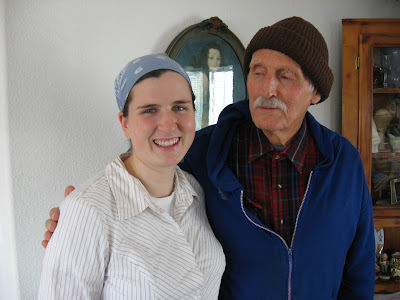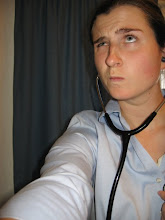Once again, I force a boring update about my life upon you. However, I thought it would be good to report every once in a while that I occasionally do things other than study and feel overwhelmed.
On Wednesday I had the pleasure of meeting one of my long time friends, Andrea, for dinner. Andrea and I did the neurobiology program together during undergrad. We were lab partners during the first year of the neurobiology program and then we continued to work together throughout the program. We became good friends, in part because of our similar interest in working internationally and in public health. During our senior year I decided to get my Master's in Public Health in International Health and Development from Tulane, while Andrea decided to go straight into medical school at the UW, but still focus her carrier on international health.
Andrea is now a third year medical student at the UW and a wellspring of medical school knowledge and wisdom. She did the IHOP (International Health Opportunities Program) between her first and second year of medical school. She went to southern India and assisted in a hospital program working on the prevention of mother to child transmission of HIV. She is also doing the School of Medicine Global Health Pathway (discussed in a previous blog post). Andrea has also been fighting tooth and nail to get a combined MD/MPH program at the UW School of Medicine. She, and some other students, have made progress towards this goal, but not enough to make it as practical as most other MD/MPH programs. The big name schools that have both a medical school and a school of public health have a combined MD/MPH program (Havard, Tulane, Johns Hopkins, etc.) that is only one additional year over the normal 4 years of medical school. However, the UW School of Public Health insists that medical students must take an additional 2 years to get their MPH. Also, the UW School of Public Health is ULTRA snobby and only takes a few students each year who they believe are worthy to study public health. Therefore, most UW med students who want to get an MPH usually take a leave of absence and just go to Harvard for year to get their MPH (an MPH from Harvard probably looks better on your resume anyway). Anyway, I am glad that I already have my MPH from Tulane so I don't have to deal with the UW school of public health nightmare.
It was really fun to meet with Andrea. It is great that we are finally at the same school again. I am hoping to do the IHOP program (this summer) as well, but I haven't heard back about my application yet.
 This is a picture of me and Andrea after dinner. Andrea is on the right.
This is a picture of me and Andrea after dinner. Andrea is on the right.
On Wednesday I had the pleasure of meeting one of my long time friends, Andrea, for dinner. Andrea and I did the neurobiology program together during undergrad. We were lab partners during the first year of the neurobiology program and then we continued to work together throughout the program. We became good friends, in part because of our similar interest in working internationally and in public health. During our senior year I decided to get my Master's in Public Health in International Health and Development from Tulane, while Andrea decided to go straight into medical school at the UW, but still focus her carrier on international health.
Andrea is now a third year medical student at the UW and a wellspring of medical school knowledge and wisdom. She did the IHOP (International Health Opportunities Program) between her first and second year of medical school. She went to southern India and assisted in a hospital program working on the prevention of mother to child transmission of HIV. She is also doing the School of Medicine Global Health Pathway (discussed in a previous blog post). Andrea has also been fighting tooth and nail to get a combined MD/MPH program at the UW School of Medicine. She, and some other students, have made progress towards this goal, but not enough to make it as practical as most other MD/MPH programs. The big name schools that have both a medical school and a school of public health have a combined MD/MPH program (Havard, Tulane, Johns Hopkins, etc.) that is only one additional year over the normal 4 years of medical school. However, the UW School of Public Health insists that medical students must take an additional 2 years to get their MPH. Also, the UW School of Public Health is ULTRA snobby and only takes a few students each year who they believe are worthy to study public health. Therefore, most UW med students who want to get an MPH usually take a leave of absence and just go to Harvard for year to get their MPH (an MPH from Harvard probably looks better on your resume anyway). Anyway, I am glad that I already have my MPH from Tulane so I don't have to deal with the UW school of public health nightmare.
It was really fun to meet with Andrea. It is great that we are finally at the same school again. I am hoping to do the IHOP program (this summer) as well, but I haven't heard back about my application yet.
 This is a picture of me and Andrea after dinner. Andrea is on the right.
This is a picture of me and Andrea after dinner. Andrea is on the right.



















